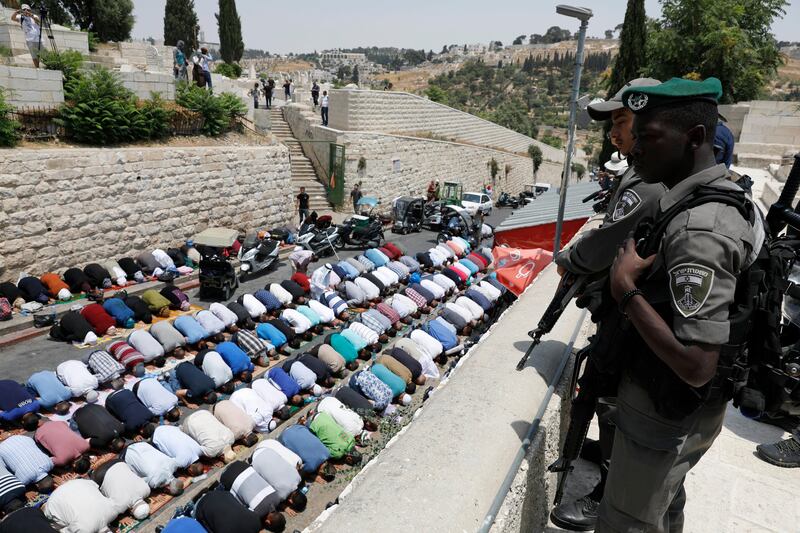Muslims in Jerusalem will not be left to stand alone in their fight to have rightful access to Al Aqsa Mosque, a group of influential scholars said as they held an urgent summit in Abu Dhabi.
The Muslim Council of Elders met in the capital yesterday to discuss “stringent measures to end the Israeli occupation of Al Aqsa Mosque.”
The council said there is a need to "support the people of Al Quds and show them they are not alone in protecting Al Aqsa”.
“Staying silent about Zionist terrorism threatens world peace,” said Dr Ali Al Nuaimi, chairman of the council.
“Further provocative moves by the Israeli occupation must be prevented.”
The council and Al Azhar - the highest Sunni religious authority in the Muslim world - will hold a conference in September including politicians and decision-makers to decide on a course of action, Dr Al Nuaimi said.
“We don’t want to jump to conclusions on what decisions will be made; we want to go to Al Quds conference with an open heart to see what can be done," he said, using the Arabic name for the holy city.
Tensions have been high at the Al Aqsa compound for two weeks after three Palestinian Israelis shot dead two policemen before being killed by security forces.
Israeli authorities responded by shutting down the area to all Muslims and installing metal detectors at the gates.
Last week further violence broke out when Israeli soldiers forced their way into the courtyard of the mosque and climbed up the building to remove a Palestinian flag.
The Israeli troops fired stun grenades and rubber bullets, wounding 56 Palestinians, according to the Palestinian Red Cross.
Israeli authorities removed the airport-style electronic gates but Muslims under the age of 50 are still banned from entering the compound.
Dr Al Nuaimi said the removal of the metal detectors did not guarantee they would not be re-installed.
“The problem of Al Aqsa has not finished. The goal is not for the situation to return as it was but to solve the issue, and to not leave Palestinians alone in their struggle,” Dr Al Nuaimi said.
The council hailed the Palestinian people, particularly those in Jerusalem, for their endurance and determination to make the occupying force “reverse their provocative procedures”.
They also called on all academic and religious institutes to focus on raising awareness about the clashes at Al Aqsa Mosque and how to support the Palestinian cause.
“The council urges educational institutes in the Arab and Muslim world to teach the history of Al Aqsa Mosque and its status in Islam,” said Dr Al Nuaimi, who is also the director general of Abu Dhabi Education Council.
At the conference, they will also discuss the possibility of a visit to Jerusalem to address the issue on the ground.
“We will see about that in the conference, and the most important thing is that the issue in Jerusalem concerns all Muslims and Christians, not only Palestinians, so we need to work together.”
Dr Kaltham Al Muhairy, a member of the council, said the meeting in September is not a late response to the crisis.
“The incident of closing down the holy mosque had a big effect on people, I don’t think they would have gotten over it in a month or two.”
She said the conference will provide a platform for the council to offer solutions for the dispute.
“We hope there will be decisions that could be implemented. During our meeting today we presented some positive suggestions which we can process during the conference.
“There will be decision-makers in the conference, because the council does not usually issue decisions without the presence of decision makers,” she said.
The council also called on Muslim and Arab leaders, regional and international organisations to take stringent measures “against the attempts of Israeli occupation to divide Al Aqsa mosque and their wicked moves to impose Zionist control over it.”
“The continuation of this terrorism will start a religious war, therefore, the international society and organisation need to deal with this issue in a purely objective manner.”







